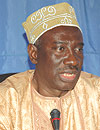Despite the refusal by the International Criminal Tribunal for Rwanda (ICTR) to have genocide cases transferred and be tried in Rwandan courts, the Rwandan government is not giving up.


Despite the refusal by the International Criminal Tribunal for Rwanda (ICTR) to have genocide cases transferred and be tried in Rwandan courts, the Rwandan government is not giving up.
This was said by the Prosecutor General Martin Ngoga Wednesday.
"We shall continue making appeals until those in ICTR understand our arguments. Many have started appreciating our judicial system,” Ngooga told Sunday Times.
He said the reasons tabled by the ICTR to deny the transfer of Genocide suspect Yusuf Munyakazi are not justified.
"Rwanda’s position is very clear. We cannot say the judges at ICTR are wrong or persecuting us. We only need to engage them until they understand our position,” Ngoga adds.
Five cases were supposed to come to Rwanda. Gaspard Kanyarukiga and Yusuf Munyakazi were among those to be transferred to Kigali.
The ICTR registry chamber supervised, approved and endorsed the Rwandan judicial system but the trial chambers still questioned it
"Time is coming when the ICTR won’t have any more ground to base its denials for the transfers.
We have been systematically upgrading our judicial system, but every time we apply for a transfer, they come up with a new reason for denying it” explains the prosecutor.
He added that there is a clear inconsistence in the reasons given by ICTR for the four consecutive cases denied transfer.
"But the truth will come to light, we shall continue appealing for home trials because it is clear the ICTR defences are being broken down,” said Ngoga.
In the Yusuf Munyakazi case, the ICTR highlighted the possibility of Rwanda subjecting genocide convicts to solitary confinement, being unsure of witness protection while on Rwandan soil, and the fact that Rwanda’s judicial system has only one judge presiding over a case.
While responding to the reasons given by ICTR in denying suspects transfers, the Prosecutor General pointed out the fact that the number of judges doesn’t determine fairness.
"If they claim that having one judge downplays fairness in a trial, and that the number of judges counts, then with the three judges they have is not enough because there are some courts with seventeen judges,” observed Ngoga
On the issue of solitary confinement, he explained that the government will explain it to the ICTR it more clearly.About witness protection, Ngoga said such a claim is baseless because Rwanda has proven capacity to protect witnesses, stating that even those in Tanzania are protected by Rwanda.
Formerly, the ICTR and Rwanda negotiated a special organic law which was actually prepared by ICTR experts with Rwandan input. That law clearly spells out conditions under which suspects transferred from ICTR and from any jurisdiction outside Rwanda will be protected.
The International Criminal Tribunal for Rwanda (ICTR) was established in November 1994 by the United Nations Security Council in order to try people responsible for the Genocide.
The ICTR mandate was initially supposed to close in December this year, but due to unfinished business, its mandate was extended for another year.
Other countries, where cases have been transferred include Holland and Norway were approved but later refused transfers reasoning that they do not have genocide in their laws.
Rwanda remained the only country interested in trying those accused of genocide crimes.
Ends


